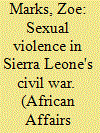|
|
|
Sort Order |
|
|
|
Items / Page
|
|
|
|
|
|
|
| Srl | Item |
| 1 |
ID:
186793


|
|
|
| 2 |
ID:
131812


|
|
|
|
|
| Publication |
2014.
|
| Summary/Abstract |
Rape and sexual violence loom large in the study of civil war in Africa. Sierra Leone has been one of the most prominent cases for establishing rape as a 'weapon of war', yet little is known about how sexual violence was understood by commanders or combatants within the Revolutionary United Front (RUF). Mainstream analyses of armed groups and civil war rarely engage with gender dynamics, despite their centrality to war making, power, and violence; and research that does focus on sexual violence tends to overlook the complex internal dynamics of the groups responsible. This article examines the internal gender dynamics of the RUF from the perspective of male and female members in seeking to understand the perpetration of sexual violence. It shows that both formal and informal laws and power structures existed to regulate gender relations and control sexual behaviour within the group. It identifies four categories of women - non-wives, unprotected wives, protected wives, and senior women - and shows that women's interests and experiences of sexual violence were not homogeneous, but were instead shaped by their status within the group. In this way, sexual violence, examined in social context, provides an entry point for understanding how power, protection, and access to resources are brokered in rebellion.
|
|
|
|
|
|
|
|
|
|
|
|
|
|
|
|
| 3 |
ID:
126446


|
|
|
|
|
| Publication |
2013.
|
| Summary/Abstract |
Contemporary understandings of rape in wartime emphasise its strategic deployment as a weapon of war. One of the most prominent cases in the discourse has been the Sierra Leone Civil War and its Revolutionary United Front (RUF) rebel group. This article complements the existing literature by examining war-related sexual violence from within the rebel group itself, exploring how sexual violence was used and understood by fighters. Counter-intuitive to received wisdom that the RUF instrumentalised rape systematically, extensive interview and archival material show that there were harshly inculcated, but ultimately ineffective policies aimed at preventing rape. These laws were central to the RUF's attempts to manage organisational control and cohesion. This calls for revisiting and revising the 'rape as a weapon of war' framework if it is to have explanatory power for the causes and mechanisms of gender violence in war.
|
|
|
|
|
|
|
|
|
|
|
|
|
|
|
|
| 4 |
ID:
165978


|
|
|
|
|
| Summary/Abstract |
Social network approaches have much to offer for the study of African politics. This research note explores the tensions and benefits of using social networks as metaphor or as method, and highlights the types of questions network research can address. We discuss sources of network data, key features of the graphical perspective and basic vocabulary, and the difference between analyzing individual networks and full systems. Three social network analysis (SNA) concepts—centrality, brokerage, and multilevel networks—indicate theoretic spaces for qualitative and quantitative synergies. The note also raises practical considerations and ethical challenges for conducting network research in fieldwork settings, drawing on a collaborative project in eastern Democratic Republic of the Congo. In conclusion, we encourage layering disciplines and mixing methods to more fully understand how networks shape social life in Africa.
|
|
|
|
|
|
|
|
|
|
|
|
|
|
|
|
|
|
|
|
|